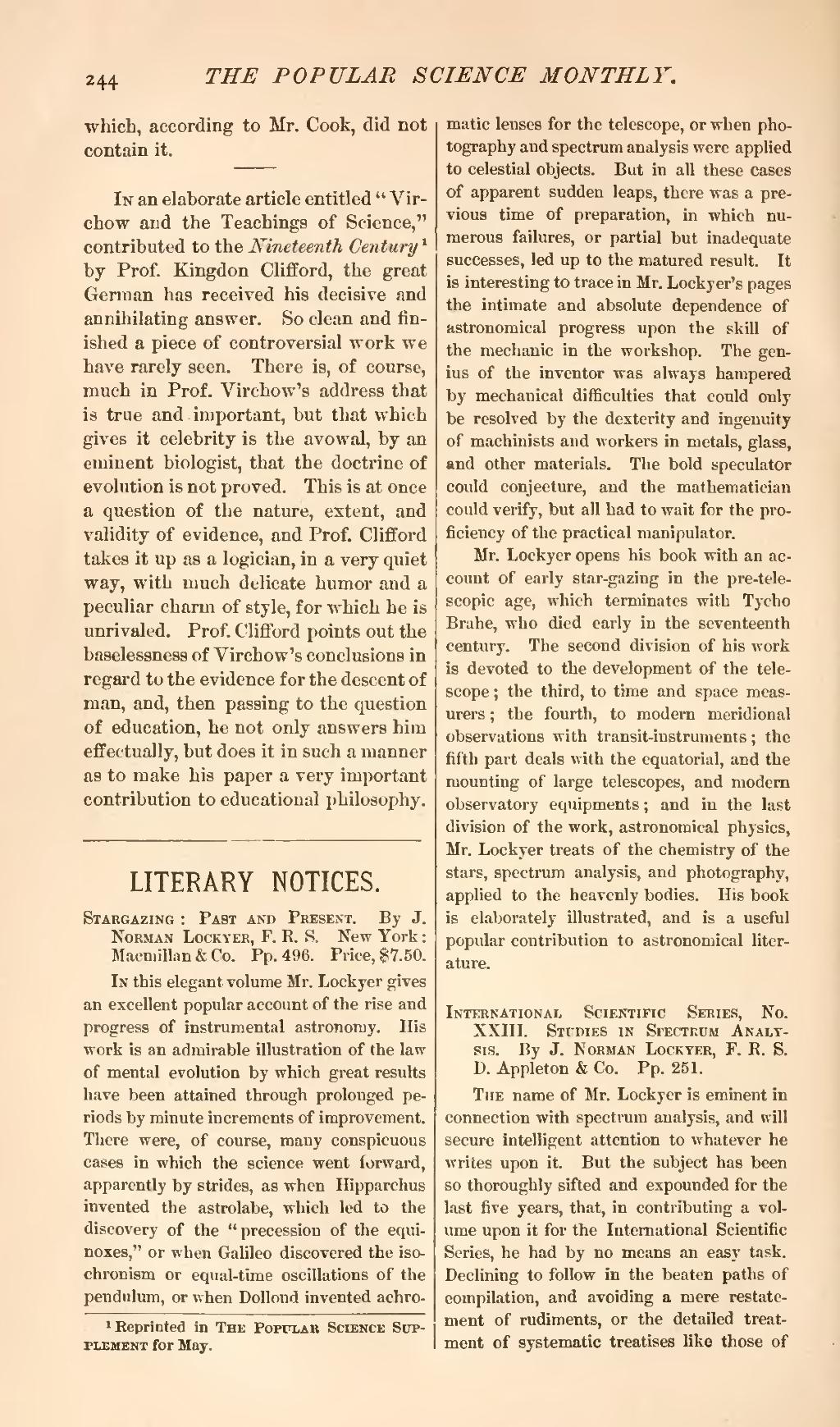which, according to Mr. Cook, did not contain it.
In an elaborate article entitled "Virchow and the Teachings of Science," contributed to the Nineteenth Century[1] by Prof. Kingdon Clifford, the great German has received his decisive and annihilating answer. So clean and finished a piece of controversial work we have rarely seen. There is, of course, much in Prof. Virchow's address that is true and. important, but that which gives it celebrity is the avowal, by an eminent biologist, that the doctrine of evolution is not proved. This is at once a question of the nature, extent, and validity of evidence, and Prof. Clifford takes it up as a logician, in a very quiet way, with much delicate humor and a peculiar charm of style, for which he is unrivaled. Prof. Clifford points out the baselessness of Virchow's conclusions in regard to the evidence for the descent of man, and, then passing to the question of education, he not only answers him effectually, but does it in such a manner as to make his paper a very important contribution to educational philosophy.
Stargazing: Past and Present. By J. Norman Lockyer, F.R.S. New York: Macmillan & Co. Pp. 496. Price, $7.50.
In this elegant volume Mr. Lockyer gives an excellent popular account of the rise and progress of instrumental astronomy. His work is an admirable illustration of the law of mental evolution by which great results have been attained through prolonged periods by minute increments of improvement. There were, of course, many conspicuous cases in which the science went forward, apparently by strides, as when Hipparchus invented the astrolabe, which led to the discovery of the "precession of the equinoxes," or when Galileo discovered the isochronism or equal-time oscillations of the pendulum, or when Dollond invented achromatic lenses for the telescope, or when photography and spectrum analysis were applied to celestial objects. But in all these cases of apparent sudden leaps, there was a previous time of preparation, in which numerous failures, or partial but inadequate successes, led up to the matured result. It is interesting to trace in Mr. Lockyer's pages the intimate and absolute dependence of astronomical progress upon the skill of the mechanic in the workshop. The genius of the inventor was always hampered by mechanical difficulties that could only be resolved by the dexterity and ingenuity of machinists and workers in metals, glass, and other materials. The bold speculator could conjecture, and the mathematician could verify, but all had to wait for the proficiency of the practical manipulator.
Mr. Lockyer opens his book with an account of early star-gazing in the pre-telescopic age, which terminates with Tycho Brahe, who died early in the seventeenth century. The second division of his work is devoted to the development of the telescope; the third, to time and space measurers; the fourth, to modern meridional observations with transit-instruments; the fifth part deals with the equatorial, and the mounting of large telescopes, and modern observatory equipments; and in the last division of the work, astronomical physics, Mr. Lockyer treats of the chemistry of the stars, spectrum analysis, and photography, applied to the heavenly bodies. His book is elaborately illustrated, and is a useful popular contribution to astronomical literature.
International Scientific Series, No. XXIII. Studies in Spectrum Analysis. By J. Norman Lockyer, F.R.S. D. Appleton & Co. Pp. 251.
The name of Mr. Lockyer is eminent in connection with spectrum analysis, and will secure intelligent attention to whatever he writes upon it. But the subject has been so thoroughly sifted and expounded for the last five years, that, in contributing a volume upon it for the International Scientific Series, he had by no means an easy task. Declining to follow in the beaten paths of compilation, and avoiding a mere restatement of rudiments, or the detailed treatment of systematic treatises like those of
- ↑ Reprinted in The Popular Science Supplement for May.

